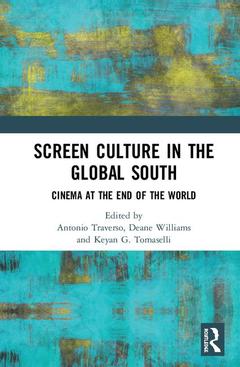Screen Culture in the Global South Cinema at the End of the World
Coordonnateurs : Traverso Antonio, Williams Deane, Tomaselli Keyan G.

This volume adopts a transversal South-South approach to the study of visual culture in transnational, transcultural, and geopolitical contexts.
Every day hundreds of people travel back and forth between southern countries, including Australia, Argentina, Brazil, Chile, New Zealand, Indonesia, Timor-Leste, and South Africa. With these people travel cultures, experiences, memories, and images. This creates the conditions for the generation, sharing, and circulation of new knowledge that is both southern and about the South as a specific kind of material and imaginary territory (or territories). It does so through the study of the southern hemisphere?s screen cultures, addressing the broad spectrum of cultural expression in both traditional and new screen media, including film, television, video, digital, interactive, and online and portable technologies.
This book was originally published as a special issue of Critical Arts.
1. Introduction: Cinema at the End of the World Part I 2. Between Political Film and Militant Video: An Analysis of the Discussions at the Rencontres Internationales pour un Nouveau Cinéma, Montreal, 1974 3. The Return to the Social through the Collective "I": Disrupting the Uneventful Face of Neoliberal Precariousness in the Chilean Documentary El otro día 4. Representations of Women’s Agency in African Anti-Colonial Struggles: The Case of Sambizanga (1972) and Mapantsula (1988) 5. After Death: Public Mourning, Discourse, and Myth in the Afterlife Representations of a Tanzanian Movie Star Part II 6. Introduction – Dossier: Screen Genres of Reconciliation in Australia, Chile, Rwanda, and New Zealand 7. Not Reconciled: Grey Matter (Ruhorahoza 2011) and the Lacunae of Post-Genocide Rwandan Cinema 8. Top of the Lake’s Emotional Landscape: Reparation at the Edge of the World 9. La Flaca Alejandra: Post-Dictatorship Documentary and (No) Reconciliation in Chile 10. Disturbing the Peace: The Ghost in beDevil and The Darkside Part III 11. "Be Careful, Cowboy": The Translation and Mutation of the Western Genre in Red Hill 12. Transnational Telenovela Remakes: Challenging Dominant Models and Old-Fashioned Heroines 13. Different but the Same: Landscape and the Gothic as Transnational Story Space in Jane Campion’s Sweetie (1989) and Lucrecia Martel’s La Ciénaga (2001) 14. Mapping the Landscape with Sound: Tracking the Soundscape from Australian Colonial Gothic Literature to Australian Cinema and Australian Transcultural Cinema 15. Kangaroo: The Australian Story 16. Beyond Poetics: Raúl Ruiz’s Rethinking of Narrative 17. The Maslyn Williams Network
Antonio Traverso is a Senior Lecturer at Curtin University, Australia, where he teaches Screen Studies. He is co-editor of El Documental Político en Argentina, Chile y Uruguay (with Tomás Crowder-Taraborrelli, 2015), Political Documentary Cinema in Latin America (with Kristi M. Wilson, 2014), and Interrogating Trauma: Collective Suffering in Global Arts and Media (with Mick Broderick, 2011).
Deane Williams is Associate Professor of Film and Screen Studies at Monash University, Australia. He was Editor of the refereed international journal Studies in Documentary Film (2006–2017). He is the author of The Cinema of Sean Penn: In and Out of Place (2015), co-editor of The Grierson Effect (with Zoë Druick, 2014), and co-editor of Australian Film Theory and Criticism (three volumes, with Noel King and Constantine Verevis, 2013–6).
Keyan G. Tomaselli is Distinguished Professor in the Department of Communication Studies at the University of Johannesburg, South Africa. He is editor of Critical Arts and has been working with various Chinese universities on cultural and media topics.
Date de parution : 01-2024
17.4x24.6 cm
Disponible chez l'éditeur (délai d'approvisionnement : 14 jours).
Prix indicatif 48,88 €
Ajouter au panierDate de parution : 06-2020
17.4x24.6 cm
Disponible chez l'éditeur (délai d'approvisionnement : 14 jours).
Prix indicatif 160,25 €
Ajouter au panierThème de Screen Culture in the Global South :
Mots-clés :
Young Men; Cabo De Hornos; Critical Arts; Damien Parer; Global South; Chilean Documentary; Cinema; Australian Cinema; Television; Tv Azteca; Post-colonial; Night Cries; Postcolonial; Political Cinema; Transnational; Screen Culture; Transcultural; La Flaca; Third Cinema; Red Hill; Southern Theory; Australian National Cinema; Commonwealth Film Unit; Cultural expression; Mexican Telenovela; Southern hemisphere's screen cultures; Ma Modise; Imaginary territory; Adelaide Advertiser; Western Genre; Brazilian Telenovela; Female Gothic; Film Weekly; Tv Globo; Choo Choo; Melbourne International Film Festival; South African Women’s Experiences; Hanging Rock
